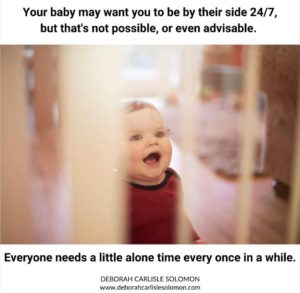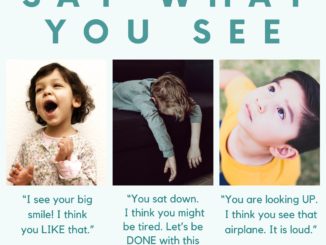There are a lot of ideas that are popular right now, many of which get lumped under the header of “attachment parenting”, which suggest (either directly or indirectly) that babies and toddlers and children are, or ought to be, fragile and clingy and needy and desperate for your attention every second of every day.
And I earnestly believe that when parents believe that and treat their children that way — added up with lots of other things, like adults directing their children’s play, and constantly correcting the children’s play, and taking away all elements of risk, and intervening in every social encounter for the children, etc, etc — then the children start to believe it too.
A lot of this grows as the child grows. A lot of this develops from the earliest foundation. Parents are afraid to let their baby be annoyed, or frustrated, or to struggle. And it makes sense, because it feels hard and awkward and cruel to sit back and let somebody else struggle when you can help them — and I’m not saying to leave them alone in distress. But I am saying that it’s okay to slow down enough to learn to differentiate between distress and determination.
(And I am also saying that we need to stop using extremely hyperbolic words like “distress” and “traumatized” and “abandonment” for perfectly normal life situations, although that’s a ramble for a different time.)
So how does that all relate to this? It relates because parents are also afraid to let their baby be bored, or lonely, even in small doses. Even enough to step away to use the toilet, or take a shower.
It’s okay to set up their space to be safe, and then to teach them how to play by themselves for a few moments at a time.
That’s the foundation that grows into independent play later, and we know that independent play has so many myriads of benefits.
“Everyone needs a little alone time every once in awhile” — refers to you, yes, YOU. But it also refers to your child, too!




